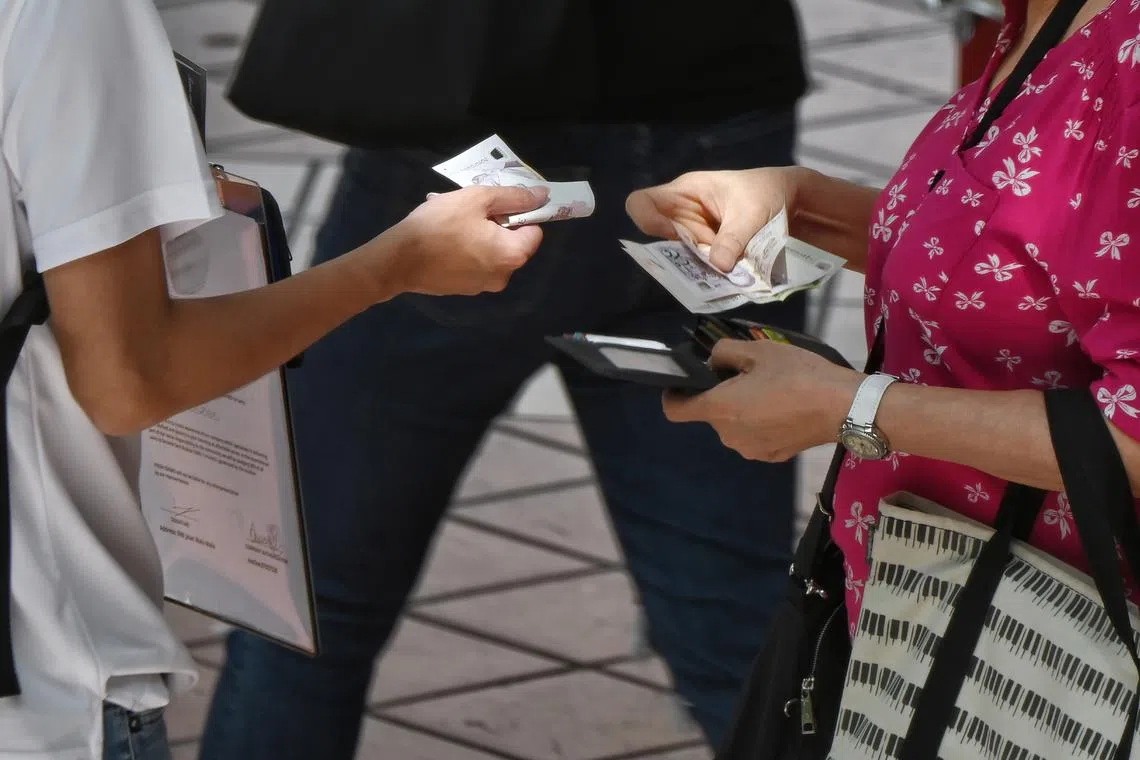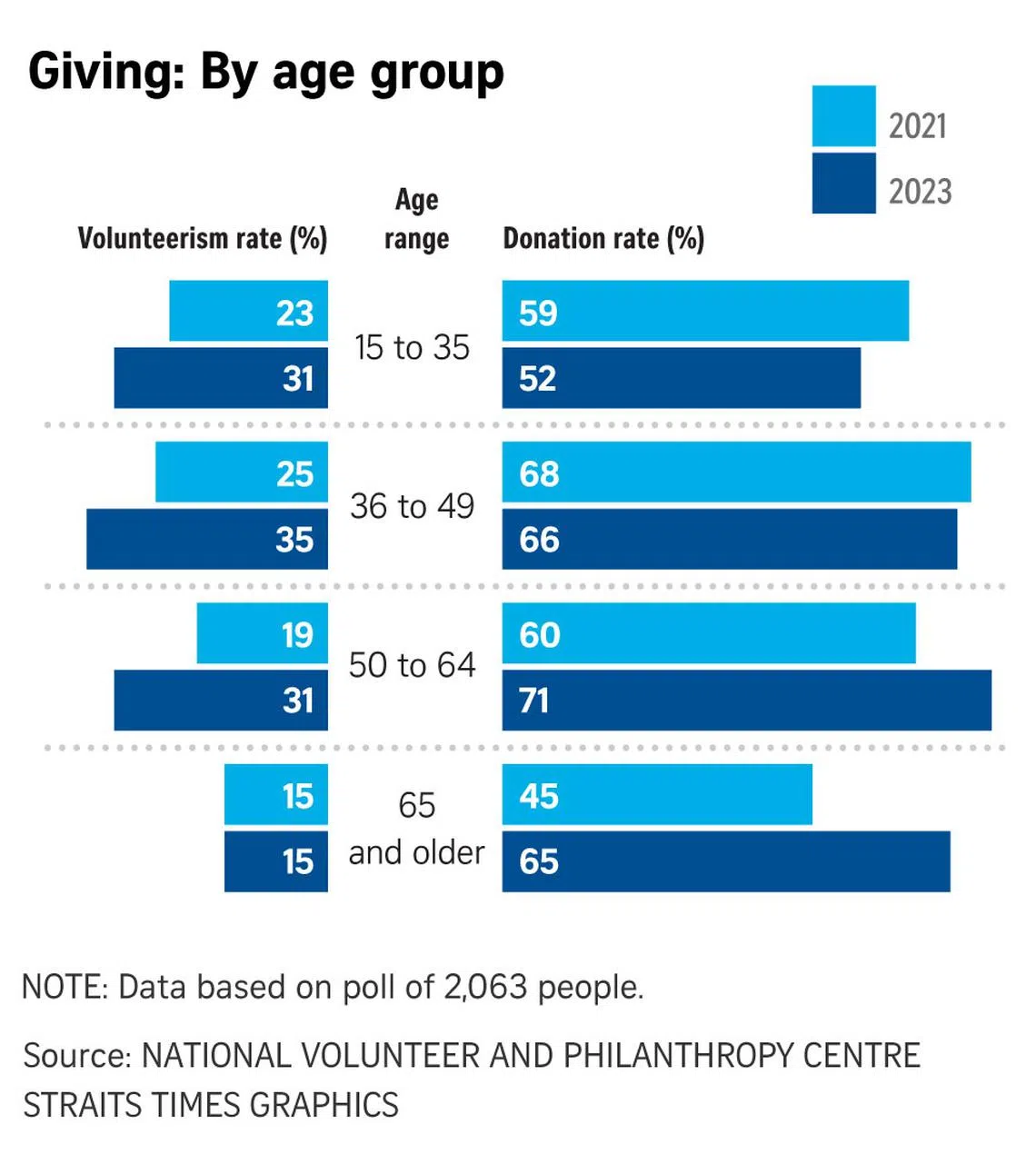People in S’pore gave less time and money to causes in 2023; scam fears hurt donations
Sign up now: Get ST's newsletters delivered to your inbox

The median amount donated in 2023 was $100, down from $200 in 2021, according to the National Giving Study 2023.
ST PHOTO: KUA CHEE SIONG
Follow topic:
SINGAPORE - People in Singapore gave less of their time and money to causes in 2023, with a fear of scams cited as a major reason by those who did not donate cash.
The median amount donated in 2023 was $100, down from $200 in 2021, while the median number of hours volunteered dropped from 12 hours in 2021 to 9.4 hours in 2023.
Despite the drop in the amounts donated and hours volunteered, the number of people who volunteered has gone back up to pre-pandemic levels. Thirty per cent of the population volunteered in 2023, up from 22 per cent in 2021.
These were some of the key findings of the National Giving Study 2023 released by the National Volunteer and Philanthropy Centre (NVPC) on June 12.
For the study, more than 2,000 people were asked about their giving habits from September 2023 to January 2024. These included volunteering and donating money, as well as other ways of helping others. The study also explored whether factors like trust had influenced giving behaviours.
Perhaps reflecting the rise in scam cases,
It found that 32 per cent of participants who did not donate in 2023 said it was due to a fear of scams. This reflects a nine percentage point increase from 2021.
The report also looked at whether trust in charitable organisations affected how frequently people donated.
NVPC said that having a negative or distrustful perception of charities in general, like believing they would use the funds poorly, could predict less frequent donations.
Childcare centre assistant Shermaine Yap, 24, said she does not donate to online fund-raisers to avoid being scammed.
She said: “I know most platforms have their own way of verifying the fund-raisers and campaigns but, with the rise in scams, I am still wary. I see my friends posting various links to fund-raisers on social media, but how do I know the person is really in need and that the money is going to a good place?
“I try my best to give back in other ways instead, like volunteering my time with the elderly, as I know I cannot be scammed that way.”
NVPC said that the drop in volunteering hours and amounts donated reflected financial and time constraints, which are major barriers to giving. Older people were also more likely to donate and volunteer more regularly than the young.
In 2023, more people donated offline rather than online, with 64 per cent of donors making their contributions in person.
The study also explored three new factors that predicted philanthropic behaviour – interest in social issues, experiences giving while young, and religion and spirituality.
People with an interest in social issues and current affairs are more likely to give more often.
Those who remember volunteering or donating before the age of 13 are also statistically more likely to do so today.

One 47-year-old participant of the study, who was cited in the report, said: “I’m sure everyone would remember your parents giving you 10 cents, 20 cents as a young kid to put into those little donation boxes.
“That was the first trigger for me.”
NVPC said that while its evidence is not enough to conclusively show whether giving in one’s childhood fosters a lifelong habit, there is value in exploring how childhood giving programmes might be designed to serve that purpose.
Religion also plays an important role in giving – those who perceive religion to be more important in their lives and those who attend religious services regularly are more likely to give.
Associate Professor Joonmo Son from the National University of Singapore, who was an adviser to the study, said it is likely that the reduced donations in 2023 were linked to the increased rate of volunteerism.
Those who could not volunteer during the Covid-19 pandemic period due to government restrictions could have turned to donations as an alternative channel to help people, he said.
Prof Son added that the drop in hours spent volunteering shows that many people see giving as an ad-hoc activity.
“Of course 9.4 hours a year is better than nothing, but it also means that volunteer work in Singapore has not been regularised.”
A stronger volunteering culture needs to be built, he added.
“Volunteering needs to be a weekly or monthly activity to make a significant impact.”



